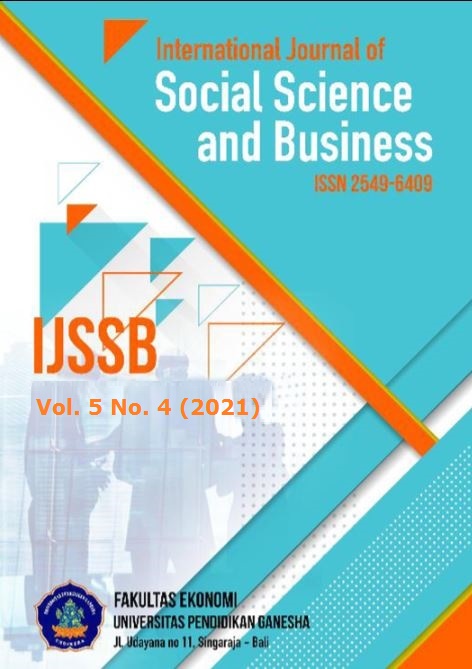The Role of The International Community in Establishing Democracy in Myanmar
DOI:
https://doi.org/10.23887/ijssb.v5i4.39400Keywords:
Democracy, International Community, Military JuntaAbstract
The existence of differences in Myanmar against the ruling regime is a significant obstacle in building opposition against the military junta. After being generalized in the November 2010 elections, it could be argued that Myanmar has moved away from reclusive authoritarianism but is not yet fully democratized. However, until now, the freedom felt by the people of Myanmar is still limited. It falls under the category of hybrid regimes encountered in the literature as 'not clearly democratic or conventionally authoritarian.' This study aims to analyze the role of the International Community towards Myanmar in promoting democratization. This study describes the political dynamics of Myanmar from its independence until the coup that just occurred in 2021. The method used in this paper is qualitative. This research collects and analyzes data from literature studies and interviews. This study found that international actors who play a role are NGOs, including ASEAN and the US, China, and Indonesia. The military coup has dashed hopes for democracy in Myanmar. The state has committed and reported as a result of civil protests to the military leadership. The coup has influenced the country to decline development in the political, social, and economic fields. In playing democracy, these actors try to develop meaning towards Myanmar using, among others, dialogue between the Myanmar civilians and the military and organizing joint talks. These methods hope Myanmar civilians get the ideal meaning of democracy.
References
Barany, Z. (2016). Moving toward democracy: The 2015 parliamentary elections in Myanmar. Electoral Studies, 42. https://doi.org/10.1016/j.electstud.2016.02.005.
Bünte, M. (2021). Ruling but not Governing: Tutelary Regimes and the Case of Myanmar. Government and Opposition. https://doi.org/10.1017/gov.2020.38.
Cantarero, M. M. V. (2020). Of renewable energy, energy democracy, and sustainable development: A roadmap to accelerate the energy transition in developing countries. Energy Research & Social Science, 70. https://doi.org/10.1016/j.erss.2020.101716.
Fisher, J. (2015). Myanmar’s 2015 landmark elections explained. BBC.
Hornat, J. (2019). Democratization through education? Theory and practice of the Czech post-revolution education system and its reforms. Communist and Post-Communist Studies, 52(3). https://doi.org/10.1016/j.postcomstud.2019.08.003.
Hteik, H., & Lwin, T. (2013). India’s Democratic Identity and Its Policy towards Myanmar from 1988 to 2010. Journal of ASEAN Studies, 1(2). https://doi.org/10.21512/jas.v1i2.64.
Jansen, L. J. M., Kalas, P. P., & Bicchieri, M. (2021). Improving governance of tenure in policy and practice: The case of Myanmar. Land Use Policy, 100. https://doi.org/10.1016/j.landusepol.2020.104906.
Jap, J., & Ziegfeld, A. (2020). Ethnic Parties in New Democracies: The Case of Myanmar 2015. Electoral Studies, 65. https://doi.org/10.1016/j.electstud.2020.102131.
Khan, M. T., & Ahmed, S. (2020). Dealing with the Rohingya crisis: The relevance of the general assembly and R2P. Asian Journal of Comparative Politics, 5(2). https://doi.org/10.1177/2057891119868312.
Kim, K. H., Kim, H.-Y., Kwon, Y. J., Mar, T. T., & Aye, A. (2020). The Effect of Global Surgery Fellowship for Tertiary Hospital Professionals from Myanmar: Current Issues and Future Challenges. Journal of Surgical Education, 77(5). https://doi.org/10.1016/j.jsurg.2020.03.013.
Kipgen, N. (2021). The 2020 Myanmar Election And The 2021 Coup: Deepening Democracy Or Widening Division. Asian Affairs, 52(1). https://doi.org/10.1080/03068374.2021.1886429.
Kriyantono, R., Ida, R., Tawakkal, G. T. I., & Safitri, R. (2022). Not just about representative: When democracy needs females and their competency to run Indonesian government public relations to management level. Heliyon, 8(1). https://doi.org/10.1016/j.heliyon.2022.e08714.
Lima, M. G. B., & Kmoch, L. (2022). Neglect paves the way for dispossession: The politics of “last frontiers” in Brazil and Myanmar. World Development Perspectives, 148. https://doi.org/10.1016/j.worlddev.2021.105681.
Mahmood, M. A., White, J., Thwin, K. T., Zaw, A., Alfred, S., Beta, & Warrell, D. A. (2020). A framework for shifting the paradigm and developing coalitions to address neglected public health problems: Lessons from the Myanmar Snakebite Project. Toxicon, 177. https://doi.org/10.1016/j.toxicon.2019.10.009.
Manosuthikit, A. (2021). Legitimation strategies and discourses in editorials: Myanmar’s new foreign policy on ASEAN membership. Discourse, Context & Media, 240. https://doi.org/10.1016/j.dcm.2021.100464.
McCarthy, G. (2019). Class Dismissed? Explaining the Absence of Economic Injustice in the NLD’s Governing Agenda. Journal of Current Southeast Asian Affairs, 38(3). https://doi.org/10.1177/1868103420911320.
Mirajiah, R. (2013). Faktor Internal dan Faktor Eksternal yang Mempengaruhi Terjadinya Demokratisasi di Myanmar. Journal Ilmiah Hubungan Internasional, 9(2). https://doi.org/10.26593/jihi.v9i2.1048.%25p.
Nare, H. (2021). Political restructuring, bureaucratization and minority groups in Myanmar: The case of Rohingya from 2011 to 2018. Asian Journal of Social Science, 49(1). https://doi.org/10.1016/j.ajss.2020.09.002.
Purnama, C., Dermawan, W., & Mahyudin, E. (2019). Democratic Transition and Reflection on Indonesia’s Efforrt to Encourage Democratization in Myanmar. Jurnal Ilmu Sosial Dan Ilmu Politik, 9(2). https://doi.org/10.15575/jispo.v9i2.5468.
Renshaw, C. S. (2013). Democratic Transformation and Regional Institutions: The Case of Myanmar and ASEAN. Journal of Current Southeast Asian Affairs, 32(1). https://doi.org/10.1177/186810341303200102.
Sadan, M., & Dan, S. L. (2021). The role of artisanal mining in the sustainable development of Myanmar’s jadeite industry. Environmental Science & Policy, 126. https://doi.org/10.1016/j.envsci.2021.09.019.
Sanchez, J. (2020). Blinded like a state? Urban sanitation, improvement and high modernism in contemporary Myanmar. Political Geography, 82. https://doi.org/10.1016/j.polgeo.2020.102255.
Stokke, K., Kham, K. K. M., Nge, N. K. L., & Kvanvik, S. H. (2022). Illiberal peacebuilding in a hybrid regime. Authoritarian strategies for conflict containment in Myanmar. Political Geography, 93. https://doi.org/10.1016/j.polgeo.2021.102551.
Suzuki, S. (2019). Why is ASEAN not intrusive? Non-interference meets state strength. Journal of Contemporary East Asia Studies, 8(2), 2. https://doi.org/10.1080/24761028.2019.1681652.
Yang, B., Swe, T., Chen, Y., Zeng, C., Shu, H., & Li, X. (2021). Energy cooperation between Myanmar and China under One Belt One Road: Current state, challenges and perspectives. Energy, 215. https://doi.org/10.1016/j.energy.2020.119130.
Zune, M., Rodrigues, L., & Gillott, M. (2020). The vulnerability of homes to overheating in Myanmar today and in the future: A heat index analysis of measured and simulated data. Energy and Buildings, 223. https://doi.org/10.1016/j.enbuild.2020.110201.











